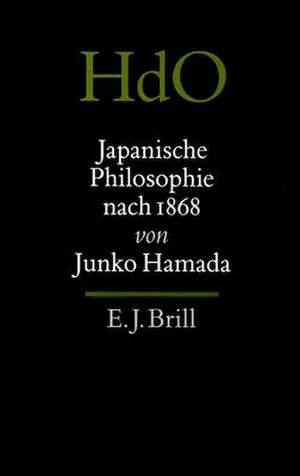Japanische Philosophie nach 1868: Handbook of Oriental Studies. Section 5 Japan, cartea 5
Autor Junko Hamadade Limba Germană Hardback – 31 oct 1993
The first chapter follows philosophical trends up to 1945; the first question treated is: How did the Japanese receive that European philosophy known as liberation and enlightenment? They soon began to develop their own philosophy, in particular under the influence of German idealism; for instance in the work of Nishida, Tanabe, Miki, Kuki and Watsuji.
The trend makes a 180-degree turn in 1945. The experiences of a defeated Japan lead to the confrontation with the self and all existing selves; it is once more a liberation, and there occurs then a new tendency, from 'reason' to 'body'; as, for instance, in Nakamura Hajime, Izutsu Toshihiko and Yuasa Yasuo.
Preț: 670.53 lei
Preț vechi: 817.72 lei
-18% Nou
Puncte Express: 1006
Preț estimativ în valută:
128.35€ • 139.46$ • 107.88£
128.35€ • 139.46$ • 107.88£
Carte indisponibilă temporar
Doresc să fiu notificat când acest titlu va fi disponibil:
Se trimite...
Preluare comenzi: 021 569.72.76
Specificații
ISBN-13: 9789004098978
ISBN-10: 9004098976
Pagini: 188
Dimensiuni: 155 x 235 x 18 mm
Greutate: 0.51 kg
Editura: Brill
Colecția Brill
Seria Handbook of Oriental Studies. Section 5 Japan
ISBN-10: 9004098976
Pagini: 188
Dimensiuni: 155 x 235 x 18 mm
Greutate: 0.51 kg
Editura: Brill
Colecția Brill
Seria Handbook of Oriental Studies. Section 5 Japan
Notă biografică
Junko Hamada, Ph.D., is Professor of Ethical philosophy at Kantô Gakuin University in Yokohama. She studied at Tokyo University and then at Tübingen University on a Humboldt-Scholarship, and has published books on Kierkegaard, D.v. Hildebrand, and translations from German philosophy.
Recenzii
'The strength of this book lies in the fact that Hamada has based her survey exclusively on the analysis of the original texts to give us an overview of the ideas of Japan's most influential thinkers.'
Margaret Mehl, Japan Forum, 1995.
Margaret Mehl, Japan Forum, 1995.












